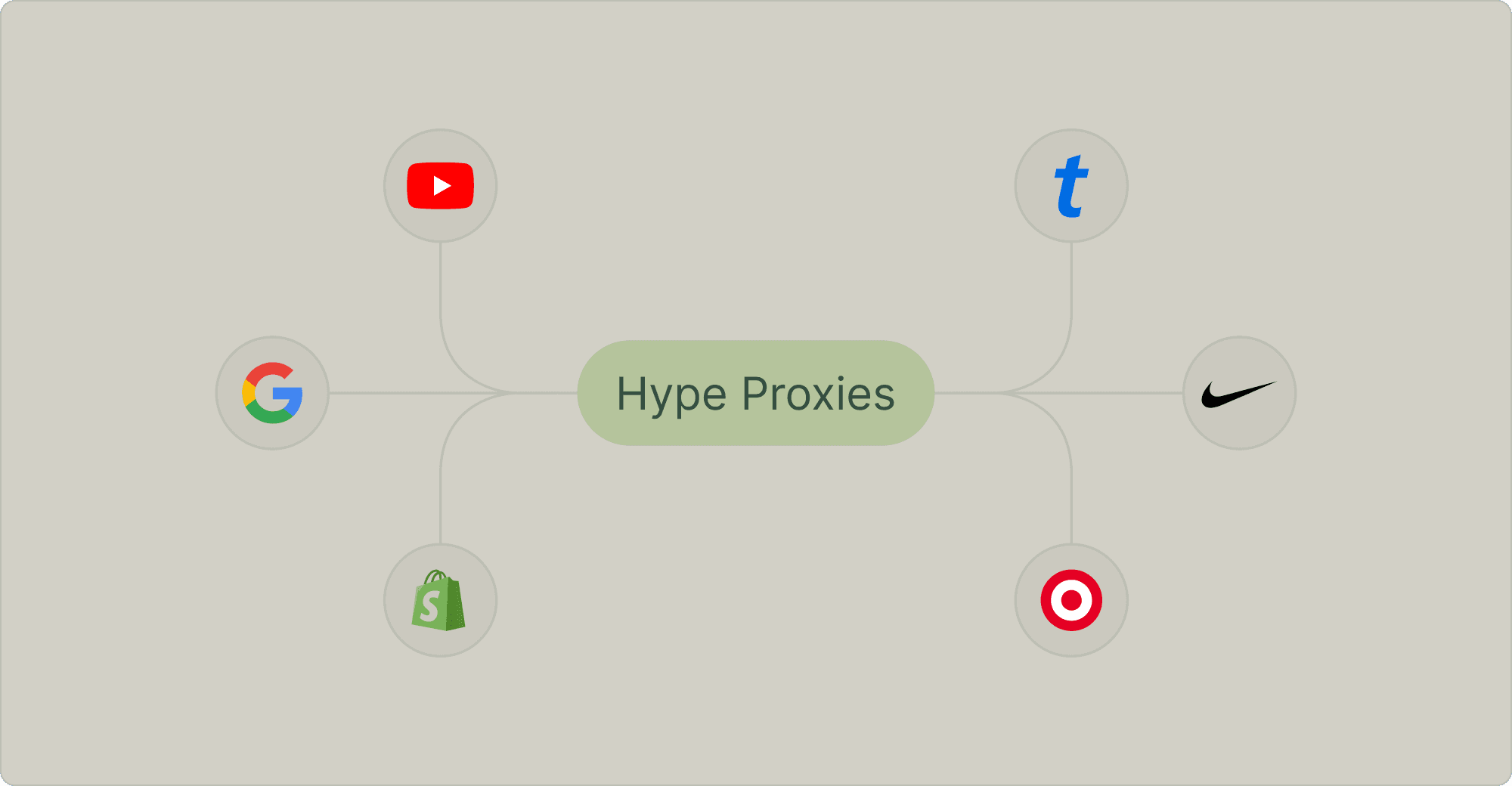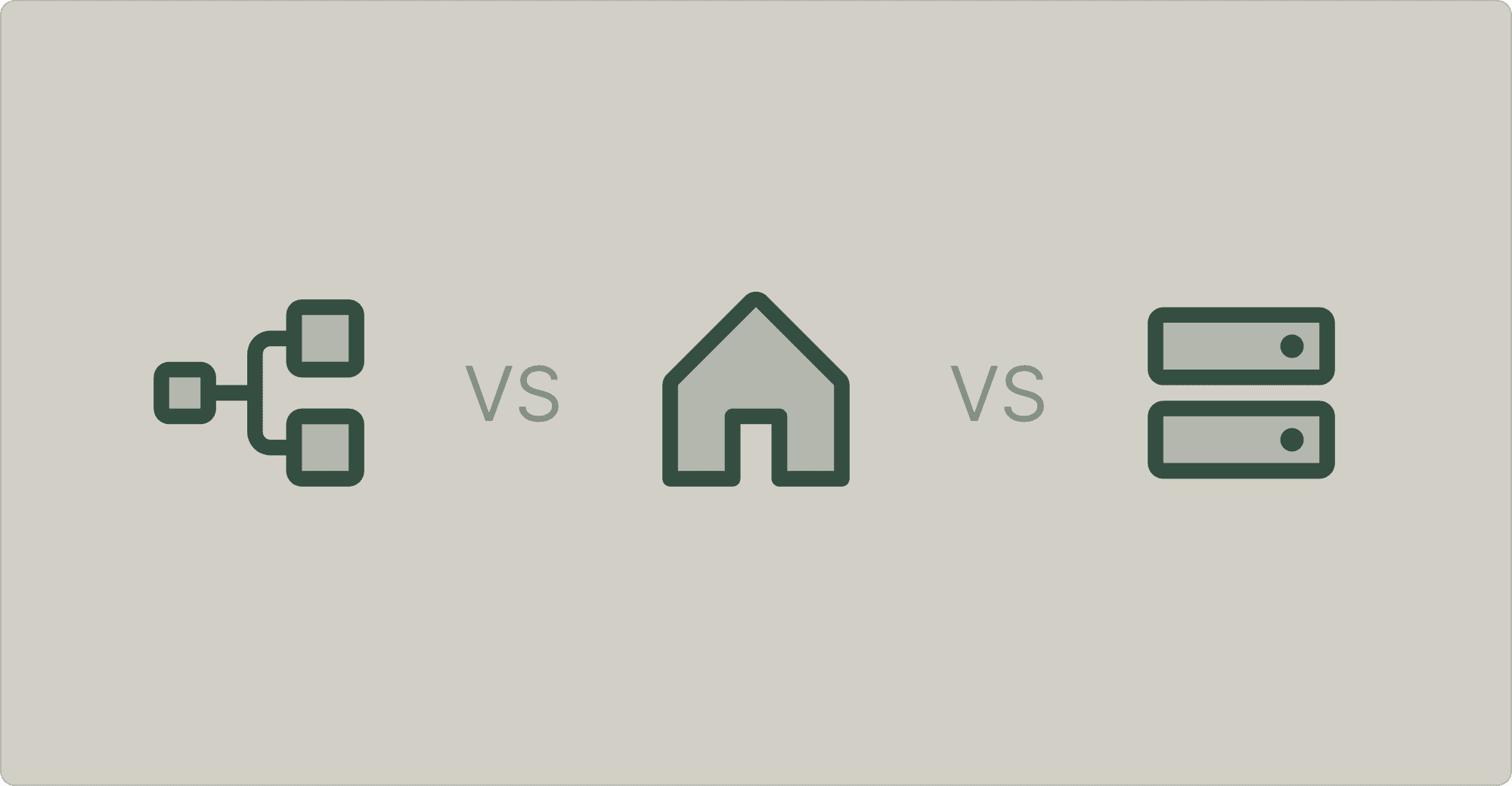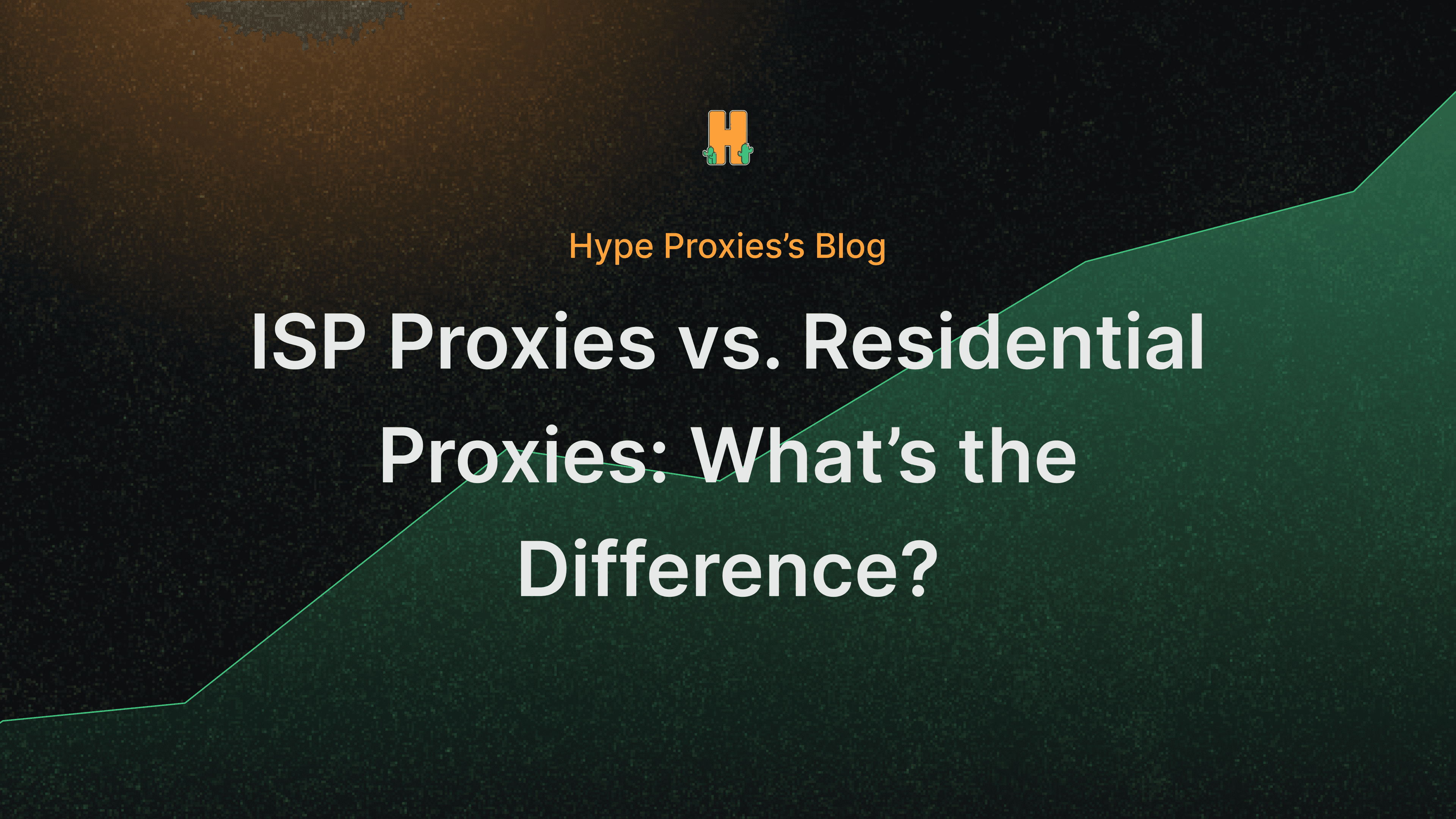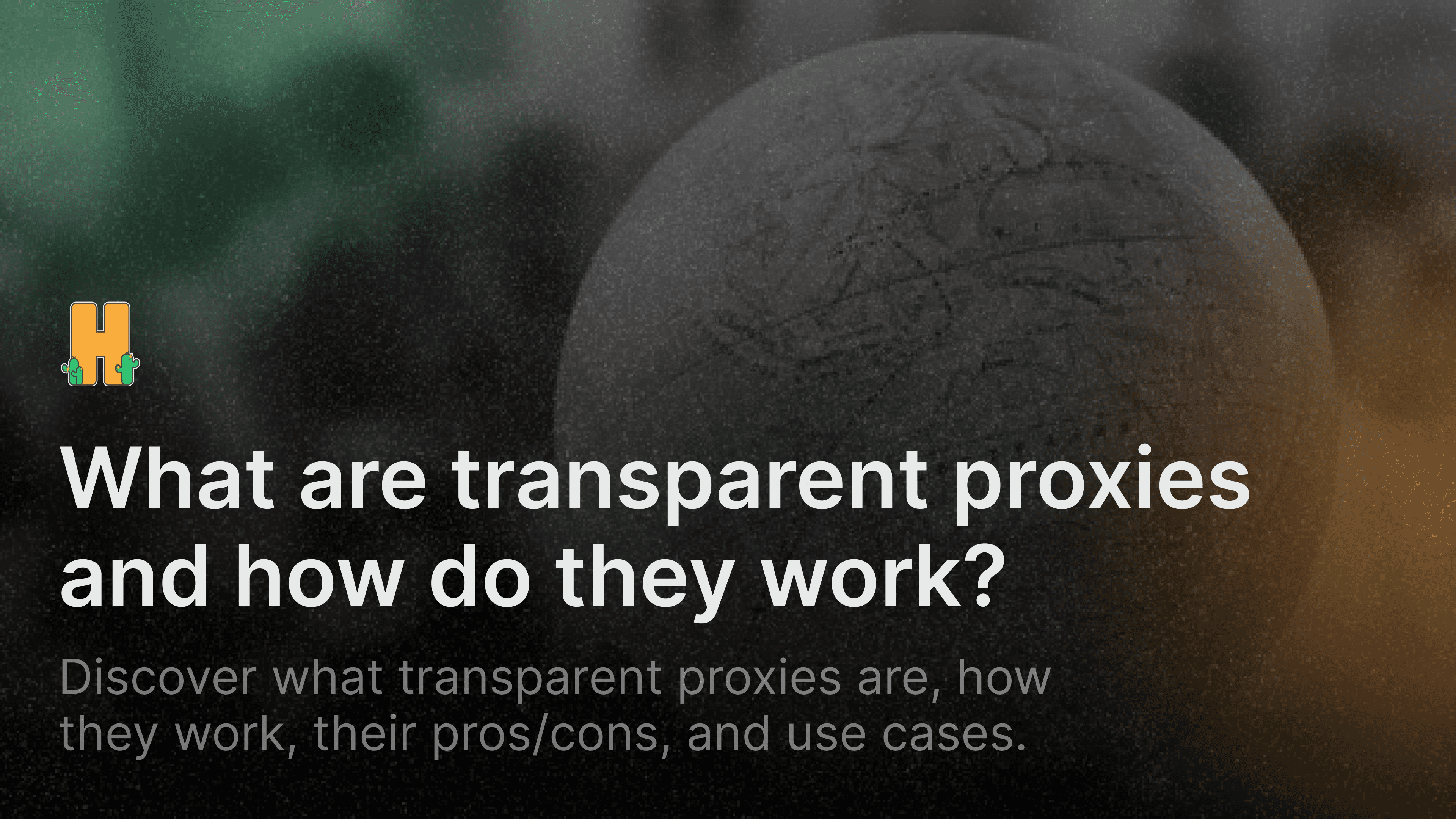What are ISP proxies and how do they work? [2025]
Learn what ISP proxies are, how they work, their key use cases, and how they compare to datacenter and residential proxies. Discover if they're right for you!

Hype Proxies
Last updated -
Jan 16, 2025
Proxies
What are ISP proxies?
ISP proxies, also called static residential proxies, are unique proxy servers that combine the high speed of datacenter proxies with the strong anonymity of residential proxies.
Let's break this down.
Datacenter proxies are hosted on fast and dedicated servers in data centers. This gives them incredibly fast connection speeds. However, their IP addresses come from large cloud hosting companies, making it easy for websites to block and detect them.
On the other hand, residential proxies use IP addresses assigned by consumer ISPs to everyday households and people. This makes it very difficult for websites to distinguish them from normal user traffic. However, they rely on unpredictable home WiFi networks, making them generally slower and less stable.
ISP proxies give you the high speeds and reliability of data center proxies while keeping anonymity high as their IP addresses come straight from actual consumer ISPs. It's like having a blazing-fast residential proxy connection!
Here's a quick overview of how ISP proxies differ from traditional proxies:
IP source - ISP proxies use IP addresses supplied by consumer internet service providers (thus the name) like Comcast, Verizon, and AT&T. This perfectly hides proxy traffic as normal residential internet activity.
Hosting infrastructure - Unlike Residential proxies that depend on unreliable residential connections, ISP proxies leverage fast and dedicated data centers for excellent uptime.
Static IP addresses - ISP proxies can retain the same IP address for months without rotating. This persistent static IP offers advantages for specific use cases (more on this later).
To illustrate, when you connect via a Verizon ISP proxy, your traffic originates from a legitimate Verizon residential IP address hosted on a high-performance server in a data center.
The website sees requests coming from a legitimate Verizon residential IP, fooling it into thinking you are just a regular user browsing the web through their consumer ISP provider! (therefore similar to residential proxies, but this time you get to enjoy the performance of a dedicated, high-tech machine)
How do ISP proxies work?
ISP proxies rely on two main techniques to work - network routing and IP masking.
Network Routing
When you connect to an ISP proxy service, the first hop your internet traffic takes is to the proxy server hosted in a remote data center.
Let's assume you are based in New York and are connecting through a Miami-based proxy server to access Netflix. Your connection request first gets routed to the proxy server in Miami through the backend network.
The proxy server has a large bank of IP addresses supplied by various consumer ISPs, such as Comcast. It then picks one of these IPs and assigns it to your connection randomly - for our example, let's say you get assigned the following IP: 164.92.196.123.
Now, when you try accessing Netflix.com, the proxy forwards your request to Netflix using this Comcast IP, making it seem like someone is browsing the web through Comcast in Miami.
When Netflix responds, the proxy directs that data back through the network to your device in New York. This allows you to mask your real identity and location.

IP masking
ISP proxy services work by partnering with legitimate ISPs, who supply them with a large pool of residential IP addresses. These IPs are typically hosted in data centers rather than in homes, but they still appear to come from real consumer ISPs.
When users connect to a website, the proxy service assigns one of these IP addresses to their traffic. Depending on the service, these IPs can be either static or rotating (more on this later)
For example, during a session, your connection might start with a Comcast IP, then switch to an AT&T IP, and later use a Verizon IP. By constantly cycling between these IPs, the proxy service mimics normal user behavior, making it difficult for websites to distinguish between traffic from a proxy service and traffic from legitimate users browsing the web through consumer ISPs.
Advantages & disadvantages of ISP proxies
Advantages
Enhanced privacy and security
Superior anonymity: Thanks to providers' advanced IP masking techniques (briefly described in the previous section), ISP proxies offer best-in-class anonymity, making it extremely hard for sites to distinguish them from real users.
Reduced risk of blacklisting: A common technique used by websites to fight bot traffic is to blacklist IPs marked as suspicious from reliable databases. But ISP proxies see significantly lower blacklisting rates compared to datacenter proxies, which allows these proxies to access many sites using blacklisting as a technique to fight bot traffic.
Speed and reliability
High connection speeds: ISP proxies are hosted in dedicated infrastructures, allowing them to reach data transfer speeds of multiple Gigabit per second and minimize latency (for example, our ISP proxies reach a transfer speed of up to 10Gbps).
Stable connections: ISP proxies guarantee exceptionally high uptime exceeding 99.9% via their reliable data center hosting and dedicated connectivity resources. This makes them perfect for operations that require round-the-clock stability with minimal disruptions (something that residential proxies struggle with)
Geo-restriction bypass
Global Access: Similarly to residential proxies, the ability to mimic users from different locales lets you bypass geographic blocking to access locally restricted content. This immensely expands options for activities like market research which require immersing in regional perspectives.
Location Flexibility: ISP proxies make it easy to switch server locations as needed. This can improve loading times and help you follow data-handling laws specific to each region, ensuring both better performance and legal compliance.
Disadvantages
Cost factors
Premium pricing: ISP proxies tend to be slightly more expensive than datacenter and residential proxies, as combining the best of the two technologies can result in higher costs for the provider.
Cost-benefit analysis: The exact return on investing in ISP proxies greatly relies on your application's scale and privacy needs. For small operations, the costs often outweigh potential advantages compared to other proxy options (e.g., if you need performance but not privacy, you could opt for datacenter proxies, and if you need privacy but not performance, you could opt for residential proxies).

Legal and ethical concerns
Legal restrictions: Some regions restrict practices like internet masking and data harvesting. We encourage you to seek legal guidance to ensure your proxy usage complies with regulations applicable to your jurisdictions.
Ethical considerations: Also consider whether the public would perceive your data collection purposes as ethical. Being transparent about your legitimate applications helps justify ISP proxy usage if questions arise.
Performance variability
Performance Consistency: While ISP proxies are generally reliable, their speeds can vary during peak internet usage. Some ISP throttling policies may also limit performance. However, for most use cases, maintaining consistent uptime is more important than achieving the fastest speeds.
ISP Throttling: In some cases, ISPs may apply strict data throttling, which can reduce the high connection speeds that ISP proxies are known for. Unfortunately, this issue is mostly beyond the control of proxy providers.
Practical use cases of ISP proxies
Web scraping
Data gathering: ISP proxies are essential for web scrapers to collect large amounts of data from sites with strict access controls. For example, a price monitoring service can scrape daily pricing info from a competitor's website. Thanks to their residential IP reputation, ISP proxies help bypass blocks, enabling smooth and efficient automated data collection.
SEO and competitive analysis: Search rankings and competitor strategies often differ by region. ISP proxies allow SEO analysts to simulate local browsing behavior, providing valuable insights into search visibility and competitor tactics in specific markets.
Social media management
Account management: Social media platforms often restrict automation and multiple accounts. By simulating real residential users, ISP proxies help mask activities like following/unfollowing, auto-liking, and sending mass direct messages. This helps avoid detection as bots and prevents account suspensions.
Marketing campaigns: Social media marketers use ISP proxies to test localized campaigns with audiences in specific countries or cities. For instance, a food delivery service can refine its ads for Mexico City by analyzing engagement data from Mexican ISP proxies, bypassing geo-targeting limits.
Ad verification
Verification processes: Ad agencies use ISP proxies to verify how their campaigns appear on publisher sites, just as viewers in different regions would see them. This allows checking ad placements, visibility rates, click/conversion metrics per geography to optimize spending.
Quality assurance: Brand safety is a rising concern with ads funding illegal or unsuitable content. Running ad displays via ISP proxies helps advertisers confirm their ads aren’t placed on websites violating brand values in target markets while reaching the desired consumer segments.
Gaming
Access to geo-locked content: Gamers use ISP proxies to bypass location-based restrictions that block certain games, updates, or in-game content. This allows them to access region-exclusive content that would otherwise be unavailable due to their actual location.
Latency reduction: Online gaming requires low latency for the best experience. By connecting to gaming servers through ISP proxies, gamers can reduce lag. The proxies route traffic through optimized data center hubs that are physically closer to the game servers, improving connection speed.
Market research
Accessing geo-specific content: Companies often offer region-specific products, services, and initiatives (e.g., purchasing power parity). Thanks to ISP proxies, marketers can simulate local navigation, allowing them to collect valuable insights into competitors' activities.
Survey deployment: Researchers use ISP proxies to distribute surveys that match their target audience's location. This makes the surveys seem more relevant to participants, leading to higher participation rates and more accurate results.
E-commerce
Price comparison: Similarly to market research, e-commerce brands use ISP proxies to collect competitor pricing data from specific locations. Analyzing this data helps them adjust their own pricing strategies to maximize profit margins in different regions.
Product testing: Retailers use ISP proxies to check foreign e-commerce sites and ensure that product images, descriptions, and inventory display correctly across various regions. This helps confirm that they’re ready for a smooth expansion into new markets.

Content delivery networks
Testing and optimization: Media streaming services use ISP proxies to test localized streaming speeds. The insights gathered help optimize routing and infrastructure to deliver fast media content in different regions.
Infrastructure scaling: CDNs use ISP proxies to simulate high regional traffic loads. This stress testing helps strengthen infrastructure, ensuring it can handle demand spikes during major events.
Types of ISP proxies
ISP proxies come in a few different forms and access models to suit different use cases. The main variants are static versus rotating proxies and shared versus dedicated proxies.
Static vs. rotating
Static ISP Proxies stick to using one persistent IP address that never changes. Each time you connect to a website through that proxy, the same IP is used to mask your traffic.
For example, we at HypeProxies always offer a non-rotating IP (unless you request otherwise, ofc).
On the other hand, rotating ISP Proxies cycle through a large pool of thousands of different IP addresses. Each time you connect through the proxy to a new domain or start a new session, it automatically assigns you a different IP.
You might use IP 174.203.201.122 on your first website visit, then get switched to 198.32.226.118 on the next site, and so on.
Static proxies are preferred for use cases like managing multiple accounts, where a persistent identifiable IP is needed to log into sites or access content across sessions. They also suit testing geo-restricted apps.
Rotating proxies help avoid IP blocks when doing heavy web scraping or crawling hundreds of domains. The constant IP shuffling also bolsters privacy.
Shared vs. dedicated
Shared ISP Proxies assign individual IP addresses simultaneously to multiple users. Thus, several people can connect through the same proxy IP.
The benefit is reduced costs due to the pooled usage. The downside is less privacy as others share the same identity.
Dedicated ISP Proxies provision exclusive access to proxy IPs for each user. So, if you use IP 174.203.201.122, no one else can use that simultaneously.
This ensures complete privacy at the cost of higher pricing. It also guarantees all proxy resources are dedicated just to your activity for maximum speeds.
Dedicated proxies suit privacy-centric tasks like market research, web analytics, brand protection, etc. Lighter workloads can rely on shared proxies to save on costs.
The ideal option depends on your budget, desired privacy levels, and the sensitivity of use cases when choosing between the two.
Comparing ISP proxies with other proxy types
ISP vs. residential proxies
We recently wrote a dedicated guide on the differences between ISP and residential proxies, but for the sake of comprehensiveness, we'll summarise it here:
Connection speed: One major advantage of ISP proxies is they offer much faster speeds. In some cases, the data transfers can reach up to 1 Gbps. Residential proxies max out at around 10-20 Mbps as they rely on consumer internet plans.
Uptime reliability: ISP proxies use dedicated data center hosting to guarantee exceptional uptime of 99.9% or higher. Meanwhile, the residential proxies suffer occasional downtimes due to the volatile nature of home connections, which can unexpectedly drop.
IP diversity: Residential proxies support vastly larger IP pools spanning diverse subnets, residential blocks, and geographic regions. On the other hand, ISP proxies have limited IP resources, which are restricted by their exclusive ISP contracts.
Static vs dynamic IPs: ISP proxies can use persistent static IP addresses that never change for months. Residential proxies always rotate IPs to mimic natural user behavior, making static assignments impossible.
If your use case relies on widely varied and geo-targeted IP addresses at immense scales, residential proxy networks are preferable despite slower speeds. Prioritize ISP proxies for applications needing consistency, speed, and reliability over large IP diversity.
ISP vs. datacenter proxies
Choosing between ISP and datacenter proxies depends on whether you need residential-level authenticity:
Anonymity: ISP proxies provide full residential anonymity, making them effective for accessing sites that block datacenter IPs. In contrast, datacenter proxies are easier to detect and less effective on sites with strong anti-bot protections.
Pricing differences: Datacenter proxies are extremely affordable at scale compared to ISP proxies, which cost two to three times more due to the complexity of ISP sourcing. However, in terms of privacy, you get what you pay for.
Use case suitability: If you don't need advanced evasion capabilities, the affordability of datacenter proxies makes them a good choice for basic tasks. ISP proxies are only necessary if you require the stealth of residential-grade IPs.
For tasks requiring high levels of anonymity, like scraping or managing multiple accounts, the extra cost of ISP proxies is worth it. For simpler needs, datacenter proxies are usually sufficient.

Summary
ISP proxies combine the best features of datacenter and residential proxies, offering fast speeds with residential-grade anonymity. Their ISP-sourced IP addresses mimic real users, making them highly effective for accessing geo-restricted content, verifying ads at scale, web scraping, and more.
However, their high costs, limited availability, and legal considerations can be obstacles to broader use. Whether ISP proxies are the right choice depends on balancing their benefits with your operational needs and budget. If achieving the highest evasion rates while keeping speed and reliability high is your top priority, ISP proxies provide exceptional value.
Frequently asked questions (FAQs)
Are ISP proxies legal to use?
For the most part, the ISP proxies are legal if you use them properly and follow the terms of service. However, some regions do limit them. Before setting up ISP proxies, we encourage you to check your local laws and the ToS of the platform/website on which you want to use proxies.
Do ISP proxies cost a lot of money?
Yes, ISP proxies are more expensive than regular datacenter proxies. But they provide better anonymity and dodging capabilities. Buying in bulk can make them more affordable. Monthly plans instead of pay-per-use pricing further reduce costs too.
How do ISP proxies compare to VPNs?
VPNs redirect all traffic from your device through an encrypted tunnel. With proxies, you can selectively apply privacy measures to specific apps and browsing sessions. Also, VPN IPs can still be flagged, unlike ISP proxies. Proxies give you more flexibility based on your needs.
Can ISP proxies speed up my internet connection?
Yes, ISP proxies hosted at data centers near you geographically can reduce latency and lag. This is key for online gaming, streaming, and other latency-sensitive tasks.
What should I look for in an ISP proxy service?
Go with providers that offer things like reliable uptime, quick customer support, frequently rotating IPs, and proxy locations worldwide. Check reviews to verify quality. See if they offer exclusive dedicated proxies too. (Psst.. you can check out ours if you want to!)
Do ISP proxies work on all websites and apps?
Most major online platforms can be accessed via ISP proxies. However, some heavily security-focused sites still manage to detect and obstruct them. No proxy is flawless when it comes to evasion. Using proxies alongside other evasion methods improves success.
Share on
No credit card required. Start your trial now
Looking for 25% off?
Subscribe to our newsletter to get a unique discount code and a free copy of our in-house proxy tester!
No spam. Unsubscribe at anytime.

![What are ISP proxies and how do they work? [2025]](https://framerusercontent.com/images/jVkd1FH711kNb9WoN1zDtpfg7sA.png)





![How to Get Unbanned from OnlyFans [2025]](https://framerusercontent.com/images/Q0UBYCLidx83aoNoryLgIl9CWs0.png)
